- Home
- Courtney Milan
The Duchess War (The Brothers Sinister) Page 7
The Duchess War (The Brothers Sinister) Read online
Page 7
“Graydon Boots.” Finney pushed back in his seat and stared at the ceiling. “Now that is a name I’ve not let myself think in years. I last worked for them back in…’58, was it?”
“That is what the records say,” Robert told him.
The man pointed his pipe at Robert. “And you’re telling me that after all these years, after Graydon Boots has been gone for over a decade, that some high Muck-a-Muck wants to award me a pension. Me.”
Robert nodded.
“Mr. Blaisdell, I spent four months in prison. It ruined my health, but my mind still works. I’ll not be believing that, I won’t. There’s some kind of trick.”
There wasn’t a trick. Robert’s grandfather had given the factory to his father as part of a devil’s bargain. His father—who had known nothing of industry—had handed the factory over to an overseer and ordered him to extract as much profit from it as he could get. Robert had only discovered the place while looking over his grandfather’s records from decades before. His father’s books, incomplete as they generally were, hadn’t even mentioned it.
“Mr. Finney,” Robert said, “I am not telling you that Graydon Boots is awarding you a pension. That would be absurd. The charity I represent has been looking into the events of that year. They’ve decided you were unfairly imprisoned.”
“I’ve been saying that for years.”
“In fact, Leicester has a curious history in that regard,” Robert said. “Did you know that more people have been convicted of criminal sedition in Leicester in the last decade than in the entirety of England?”
Another thing his father’s overseer had started, as best as Robert could tell, and that hadn’t ended when the factory went under.
“We speak our minds here, we do.”
Robert set the papers on the table. “Speaking your mind is only illegal if your words are intended to create disaffection with the government. Not with your masters; with the government.” At first, Robert had only wanted to try to make right what his father had destroyed. But the closer he’d looked, the more he’d found. He’d eventually gone through the records of those trials, and it was clear that the jury had not been correctly charged with the law. “You should never have been convicted simply for organizing a union.”
Finney looked at him, shaking his head. “As you say. But the masters get what the masters want. I don’t want to be involved any longer. I’ve my hands full with the Cooperative, I do.”
As if to emphasize this, the door to the tiny room opened. Two women stood in the doorframe. One, a thin elderly woman in a sagging brown gown had a sack of groceries. She shoved at a yellowing cap that was slipping from her head, and gestured to her companion. “I just don’t think it will work, is all I’m saying.”
Her companion was Miss Pursling. She seemed a picture of severity, her honey-brown hair pulled tightly up, with only a few tamed curls at her neck.
The two women were focused totally on one another.
“Mrs. Finney,” Miss Pursling was saying, “I’ve talked to every chemist in town. You’re my last hope.”
Mrs. Finney unwrapped her shovel. “But the Cooperative sells food. Not any of that other nonsense.”
“But the advertisement—”
“Miss Pursling, I do like you, but how can I bring this before the Board?”
Miss Pursling looked down. “You have no idea how the rest of the Commission will scold if I come back a failure.” She did meek well, her head bowed, her hands clasped in front of her. “Please.”
“Well.” Mrs. Finney set her shawl on the entry table. “I suppose. Maybe. I might say something.”
“Thank you,” Miss Pursling said. “Thank you.”
That was the moment when her husband intervened. “Mrs. Finney,” he called. “We have a guest. You’ll never believe what he is saying.”
The two women turned to Mr. Finney. Miss Pursling’s gaze fell on Robert. Her eyes widened and she took a step back.
“It’s a gentleman from London,” Mr. Finney said. “Mr. Blaisdell, my wife. And Miss Pursling. He’s a solicitor, I believe.”
Miss Pursling didn’t bat an eye at that. “A solicitor,” she repeated. “How curious, Mr. Blaisdell.”
“Merely a representative,” Robert returned.
“Mr. Blaisdell here is saying that there’s a fund that has established pensions for men who have devoted themselves to unions, who find themselves in poor straits for it.” Mr. Finney laughed.
Mrs. Finney simply frowned. “Well, then what could they want with us?” She looked around. “There’s only the two of this in this wide, big room, and we have meat on the table three times a week. We’re not poorly off.”
Robert blinked at this and looked around the room, trying to see it with her eyes. Not poorly off?
“They’ve offered me a pension!” Finney laughed. “Me! When the only service I did for Graydon Boots was to get everyone to turn out after Jimmy died of poisoning.”
Robert looked away. One of the overseer’s first cost-cutting mechanisms had been to replace the original boot-blacking with a formula that was less expensive—but far more dangerous for those who had to stand with their hands immersed in it on a daily basis. Money couldn’t make up for that, but he’d had to try.
“Yes,” Robert said. “And I’ve explained this isn’t for your work at Graydon Boots, but for your experience in organization.”
Finney simply shook his head sadly. “You’re a young lad. You wouldn’t understand. I learned my lesson, then, about keeping to my place. No more turning out. No more association with that sort of thing. Especially not now. I hear the Duke of Clermont’s in town.”
“He is,” Miss Pursling put in.
Finney spat on the ground. “It all started when he acquired Graydon Boots.” His hands, liver-spotted with age, trembled. “More hours worked for less pay. Then came the strike-breakers, the convictions. He’s a beast of a man, and I’ll never—”
“Nathan Finney,” Mrs. Finney interrupted, “that’s dangerous talk. You were taken from me once. Did you not learn to think before you speak?”
“No, no,” Robert said. “You needn’t hold your tongue on my account. I am quite in agreement.”
Miss Pursling took two steps into the room. “You are, sir?”
She clearly thought he was here on a whim.
He turned to her. “I’ve gone through the records of what Clermont did,” he said softly. “Is it so wrong to want to make matters right again?”
She turned her head away. “I question only your methods.” A trace of a frown flicked across her face. “Your motive…I do not yet understand.”
“But my motive is simple. I think privileges are wasted on the peers,” Robert replied. “They have the right to be tried in the House of Lords. Think, Mr. Finney, what that would have meant for you. The Lords would never have heard a case of criminal sedition based on the evidence presented against you. The law is too clear; they’d protect their own.”
“Too true, too true,” Finney echoed.
“I think,” Robert said, turning to Miss Pursling, “that if the Duke of Clermont, for instance, were to write handbills saying what Finney here had said back in ’58—now, he could speak the truth and nobody could stop him with threats of imprisonment based on a perversion of the law.”
Miss Pursling had tilted her head at him. “Could he?” she asked.
Finney nodded. “All too right, Mr. Blaisdell.”
“But peers use that privilege not to speak truth, but to suppress it. Think, Mr. Finney, what could you do with a seat in the House of Lords?”
“Me, sitting in the Lords?” Finney laughed. “I should like to see that.”
“So should I,” Robert said. “If I had a chance to be a part of this nation’s governance, I’d not waste it protecting my prerogatives and interests. No. I’d find every last way that the deck was stacked to allow people like Clermont to poison his workers, and to punish them for voicing complaint when he did so. And I’d eradicate t
hem all.”
He was surprised by the vehemence in his voice.
“Now that,” said Mrs. Finney, “that is sedition, and best not to say those words no matter how safe you think you are. You’re young, Mr. Blaisdell. We were all once young. But take a deep breath and put such talk away. It’ll do nobody any good.” She glanced warily at Miss Pursling. “Besides, Miss Pursling, have you not met the Duke of Clermont? You do travel in those circles. Sometimes.”
Mr. Finney subsided in his chair, somewhat embarrassed.
Miss Pursling looked away from Robert. “I have.”
“And how is the old bugger?” Finney asked. “One can only hope—”
“Shush, Mr. Finney.”
“I believe,” Miss Pursling, “that this is the other man’s son.”
Finney brushed this off. “Seen one duke, seen ’em all. Am I right, Mr. Blaisdell, am I right?”
Robert didn’t answer. He simply watched Miss Pursling. She’d scarcely shown any emotion at all as he spoke, not even a furrow of concentration on her brow.
She shook her head now. “He’s tall. He’s wealthy. He’s handsome, and those things rarely bode well for a man’s character.”
Robert winced.
But she wasn’t done. “I very much doubt he understands what it means to be a working man, and I suspect that all his life he’s had anything he wanted handed to him, just for the wishing.”
It was a harsh judgment, made harsher still because it was the truth. Robert burned in his seat.
“Men who have only known easy times often cannot comprehend hard ones,” Miss Pursling said.
Amazing how deeply facts could cut. Robert couldn’t even be angry with her. It was no more than he’d told himself of an evening.
“And yet…” She trailed off, shaking her head, and Robert leaned forward, desperate to hear what she might say of him.
Her voice was so quiet, and yet the room seemed quieter still, waiting for her to fill the silence.
“And yet,” she said, without once looking Robert’s way, “I think he is not at all like his father. I don’t know what to make of him.”
He felt rooted in place, unable to move. She hadn’t glanced his way once as she spoke. She hadn’t raised her voice. And yet those words, spoken in a near-whisper, seemed like a benediction whispered over his head.
Not at all like his father.
He let out a shaky breath. “So will you tell the magistrates about this conversation, Miss Pursling?”
“And involve the Finneys? I think not.” She bit her lip. “Tell me, Mr. Blaisdell. This charity you represent. Are you offering pensions to everyone who worked at Graydon Boots?”
Not everyone. They wouldn’t believe that, for one. Half of them were dead; more had left town.
“Those who were wronged,” he said tightly, looking away.
“Mrs. Finney,” Miss Pursling said, “I am most grateful for your agreement to present the proposal to the board of the Cooperative.”
“Of course,” the other woman answered.
“Mr. Finney. Mr. Blaisdell.” Miss Pursling inclined her head, touched her skirts in a mild curtsey, and withdrew.
He’d thought her unattractive in this mode, head turned down, voice so quiet. Not any longer. Some women blazed with light and energy. Miss Pursling reminded him of the pearlescent hint of dawn that crept under the door after a long, long night. There was a quiet grace to her, like a tiger pacing in its cage. There was a majesty in claws unused, in muscles poised for action that never came. There was a somber beauty to a caged beast.
He wanted to see her break free of that melancholy. He wanted her to turn those knowing eyes on him and tell him that he wasn’t his father, that he wouldn’t be him.
What stood between them had become infinitely simple and entirely too complicated all at once.
Not at all like his father.
He wanted her to say that again, and he wanted her to mean it.
Chapter Six
ROBERT’S DREAM THAT NIGHT—as so many of his dreams were these days—was charged with sexual longing.
In this dream, he had Minnie where he’d first met her: behind the davenport in the Guildhall library, the curtains shielding them from all eyes. This time, though, instead of listening to someone else’s conversation, they heard the gentle murmur of ocean waves. Neither remarked on the oddity of the sea in a library. Instead of being fully clothed, Robert wore nothing at all—and she was stripped to the waist. The dream version of Minnie smiled up at him with inviting allure. Her honey-brown hair was down and it curled over her shoulders, framing naked breasts tipped with deep rose. Those breasts brushed his knees as she knelt before him and took the length of his cock in her mouth.
The details of his dreams were always frustratingly vague. He couldn’t feel the wet heat of her mouth or the pressure of her tongue. There was only the fire of his own burning lust and a dulled sensation of want. But at least in dreams, one needn’t worry about morality or consequences. In dreams, there was nothing but the physical truth of desire, and that had him firmly in its grip.
In his dream, she was very, very good. He knew it, even though he could not quite feel it. No matter how he pivoted, no matter how he held her, he couldn’t really touch her. Just the force of his own red-hot desire growing with every stroke. He could only lust, and lust, and lust again.
“God, Minnie,” he begged in his dream. “Give me what I want.”
But instead of taking him harder—or shifting herself so that he could plunge inside her—the dream Minnie simply looked up at him and sat back on her heels. “If you insist,” she said with a coquettish smile. She leaned in, and suddenly, as these things were in dreams, she was whispering in his ear. “I know who you are.”
The shock was so great that it woke him. He blinked, blearily. It was the middle of the night, and silence reigned. His bedchamber was dark. Even though he’d tossed off most of the covers in his sleep, he felt as if he were burning with fever. His cock was rock-hard, his body shuddering with tension, demanding relief. And he couldn’t dispel the image from his dream. Miss Pursling, unclothed, her hair down to her shoulders, looking up at him with that brilliant smile.
God.
He’d thought that it would have been hard to explain what he saw in her to his friends. She wasn’t classically pretty; she wasn’t even striking. And while her figure had much to recommend itself, he was aware that there were better.
Maybe it was simply this: When first she’d seen him, she hadn’t seen a duke, but a man who wrote radical handbills.
I know who you are.
His left hand slid around his erection.
Robert believed in restraint. He made it a point not to emulate his father. He refused to be the kind of man who took a woman just because he fancied her. But, damn it, sometimes he wished he were. He wished he were with every part of his being.
He threw off the sheets that still covered him and let the cold air wash over him. It did no good.
It never did any good, not by itself. Instead, he slid his palm down his cock, ever so slowly, letting himself fall into that familiar rhythm. He let the dream play back in his mind—Minnie on her knees, Minnie smiling up at him as her lips closed around his member. He stroked himself in short, sharp jerks, letting them come faster and more urgent until the moment of climax came.
And in that moment, he imagined Minnie giving him that smile—a smile that held nothing back—and saying that she knew who he was. He bit his lip against the savage pleasure that filled him.
It took a few moments for reason to find him afterward, for him to admit that he found himself in a state that was unusually fixed on one person. This was not the first time he’d dreamed of her. It wasn’t the first time he’d awoken in a fit of wanton lust and indulged himself, either. In his mind, he’d had her against walls and in beds. The beauty of masturbation was that he always got what he wanted, how he wanted it. Nobody was hurt, and it left no lasting effects.
<
br /> I know who you are.
He stared into the darkness of the night. It had just been a dream, of course. Things happened in dreams that had no bearing whatsoever on reality. If his dreams had any relation to the truth, he’d have been exiled from decent company years before. Still, dreams often served as a lever for his lust. He’d wake in a fever, would think about the images from his dream as he brought himself to climax, and the combination of the dream and his own efforts alleviated the worst of his frustrations.
But there weren’t enough orgasms in the world to give him relief from the want that coiled about him now. Up until this point, he’d had the good sense to indulge in desires that he could easily satisfy. No reason to change that now.
I know who you are.
He stared into the darkness and wished those words away. Instead, they hung about him, unsaid and yet still ringing in his ears.
She didn’t think he was his father. He wanted her to know who he was. And he wanted to know her back.
DESPITE ROBERT’S BEST EFFORTS, it was a week before he saw Miss Pursling again—and that was a meeting he had to engineer.
He’d made a donation of one hundred pounds to the Workers’ Hygiene Commission. That made him one of their patrons—and wouldn’t it make sense to see how his money would be spent?
The Commission, however, didn’t meet in a respectable private room at the Three Crowns Hotel, or in the front room of the Bell. It met instead on the outskirts of the old town, at a run-down place called the Nag’s Head Hostelry.
Robert arrived ten minutes after the appointed time and drew no eyes at all when he slipped into the room behind a barmaid. She bustled about the room in swift competence, filling the ladies’ cups with what looked like barley water, pouring weak beer for the gentlemen, swiping up the inevitable spills with a wide, dirty towel that hung from her apron strings.
Nobody paid any attention, they were already so intent on their argument.
He made his way to a chair in the back and sat down.
Not only was this particular commission held in an odd location, but the composition was surprising. He’d sat on enough charitable boards to know what to expect—a few wealthy people, who’d been asked for their money and their connections, rather than their knowledge, interspersed with a few professional folks. But here, there was a man he remembered as a doctor. There was Captain Stevens. Miss Pursling, of course, seated next to a wealthy-looking older woman. Those formed the usual sort that made up these charity boards. But across the table, there sat a young woman, maybe Miss Pursling’s age, dressed in a serviceable shirtwaist. Next to her was an older, grizzled man dressed in well-patched tweed. One seat over was a plump woman in a high-necked black wool gown, complete with a round, black collar—the kind of uniform that shouted that she was in service. Half the participants had the look of working people.

 Her Every Wish
Her Every Wish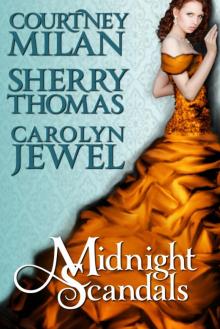 Midnight Scandals
Midnight Scandals After the Wedding
After the Wedding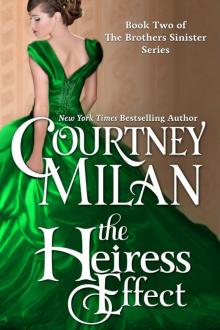 The Heiress Effect
The Heiress Effect Unraveled
Unraveled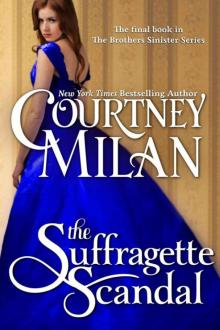 The Suffragette Scandal
The Suffragette Scandal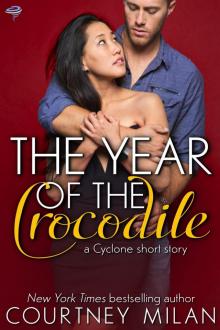 The Year of the Crocodile
The Year of the Crocodile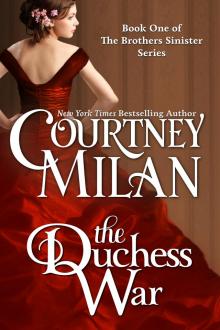 The Duchess War
The Duchess War What Happened at Midnight
What Happened at Midnight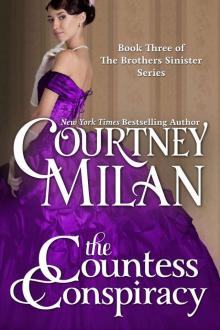 The Countess Conspiracy
The Countess Conspiracy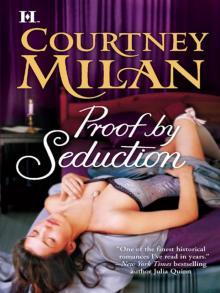 Proof by Seduction
Proof by Seduction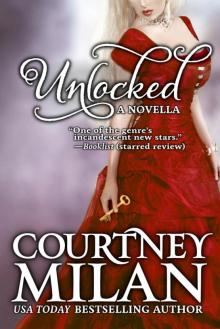 Unlocked
Unlocked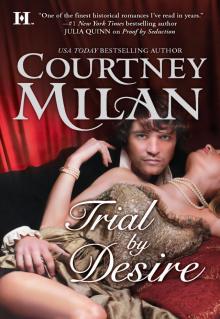 Trial by Desire
Trial by Desire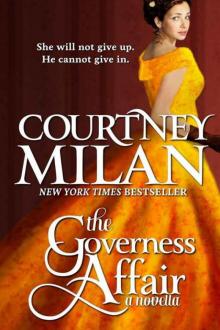 The Governess Affair
The Governess Affair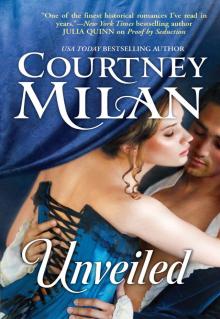 Unveiled
Unveiled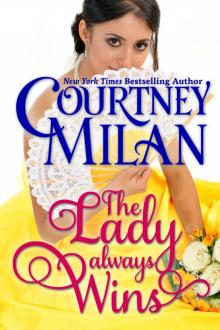 The Lady Always Wins
The Lady Always Wins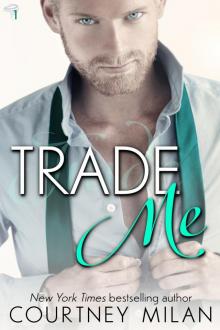 Trade Me
Trade Me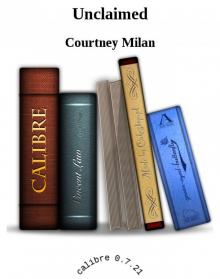 Unclaimed
Unclaimed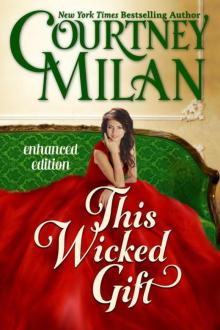 This Wicked Gift
This Wicked Gift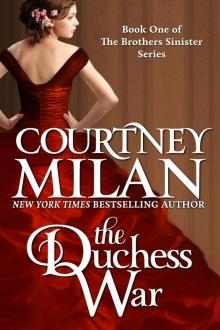 The Duchess War (The Brothers Sinister)
The Duchess War (The Brothers Sinister)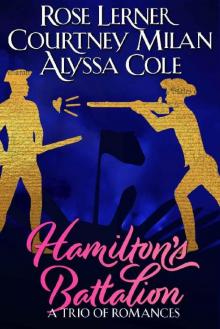 Hamilton's Battalion: A Trio of Romances
Hamilton's Battalion: A Trio of Romances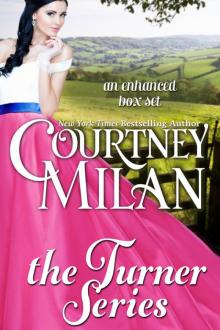 The Turner Series
The Turner Series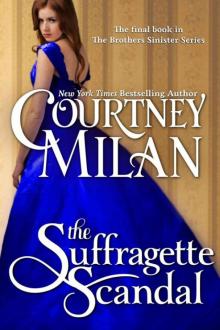 The Suffragette Scandal (The Brothers Sinister)
The Suffragette Scandal (The Brothers Sinister)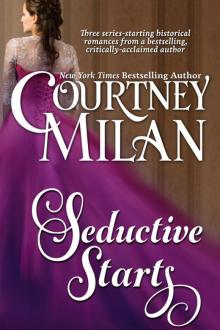 Seductive Starts
Seductive Starts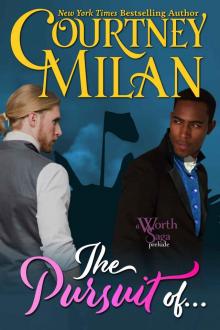 The Pursuit Of…
The Pursuit Of…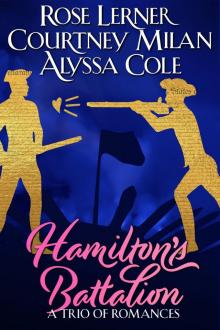 Hamilton's Battalion
Hamilton's Battalion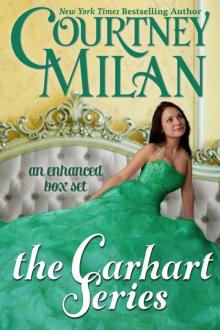 The Carhart Series
The Carhart Series Seven Wicked Nights
Seven Wicked Nights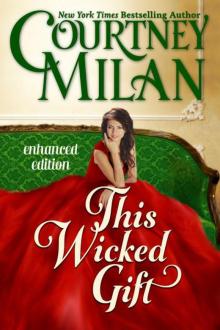 This Wicked Gift (A Carhart Series Novella)
This Wicked Gift (A Carhart Series Novella)